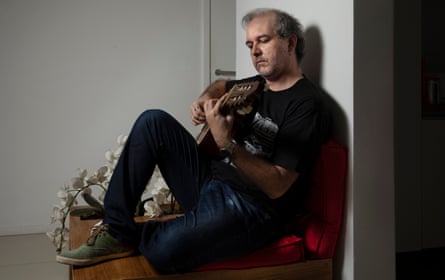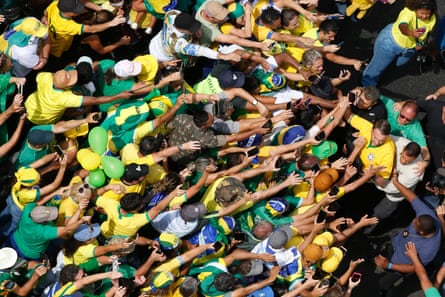Is coup trial ruling the beginning of the end for Bolsonaro and his supporters?

By Guardian-Tom Phillips -Thu 27 Mar 2025 11.38 GMT
There were cries of joy in progressive parts of Rio on Wednesday as Brazil’s supreme court ruled that the former president Jair Bolsonaro should stand trial for an alleged coup plot.
While many in Brazil delight at the ex president’s predicted downfall, others fear who may follow in his far-right footsteps. “No amnesty! No amnesty!” one elated lefty roared from his balcony into the sunny autumn afternoon.
Across the bay in the city of Niterói, the composer Edu Krieger was so delighted by the prospect of Bolsonaro serving time he wrote a song – a parody of a Tom Jobim bossa nova classic called Waters of March – celebrating the downfall of the “coup-mongering fascist”.
“It was a feeling of relief,” Krieger, one of many progressive Brazilians who abhor the far-right populist for his attacks on culture and human rights, said of the court’s decision.

Thousands of miles north, deep in the Amazon, the Yanomami leader Júnior Hekurari also voiced satisfaction. “Never before were we so abandoned by the Brazilian state [than during Bolsonaro’s 2019-23 administration] … His words encouraged thousands of illegal miners to infiltrate our forests, bringing mercury, violence and environmental destruction,” Hekurari recalled.
Bolsonaro’s critics have said they hope this week’s ruling will end his divisive and hate-filled 36-year career, in which the paratrooper turned politician underwent an astonishing transformation from eccentric backbencher to the country’s most powerful man.
“He turned his back on us – and now the world can see the consequences of his acts,” said Hekurari, condemning Bolsonaro’s “negligence and omission” for plunging his Yanomami people into a deadly crisis of hunger and pain.

Bolsonaro’s future looks bleak after the unanimous ruling. When he goes on trial, possibly later this year, few believe the politician will escape punishment for allegedly leading a murderous conspiracy to stop his left-wing successor, Luiz Inácio Lula da Silva, taking power after his 2022 election win. Those crimes could earn the 72-year-old a sentence of more than 40 years.
As she voted for Bolsonaro to be put in the dock, the supreme court justice Cármen Lúcia Antunes Rocha launched a searing attack on the kind of authoritarian takeover the far-right politician is accused of plotting. “Dictatorship kills. Dictatorship lives off death – not just the death of society and of democracy, but of human beings made of flesh and bone who are tortured, mutilated and murdered,” she said.
Bolsonaro tried to strike a defiant tone during a rambling, peevish 45-minute pronouncement to reporters, insisting he was innocent of “unfounded” accusations. “I’m not obsessed with power, I have a passion for Brazil,” he shouted, before a prankster trumpet player gatecrashed the press conference with a sarcastic rendition of Chopin’s Funeral March.
Maria Cristina Fernandes, a columnist from the Valor Econômico newspaper, said she believed Bolsonaro cut a diminished figure. “It was the speech of someone who is bewildered, who doesn’t have a strategy … I saw a Bolsonaro who was lost and I think [in his position] anyone would be,” she said.
Fernandes said she thought Bolsonaro – who she expected to be convicted – would try to grab two lifelines as he fought for political survival.
The first involved securing a presidential pardon by helping to elect a right-wing president in next year’s election, in which he is banned from running. Bolsonaro had hoped his congressman son, Eduardo, might stand in his place. But Fernandes said she believed the court’s verdict meant he would instead be compelled to support São Paulo’s less radical right-wing governor, Tarcísio de Freitas, who stood a better chance of winning.
Second, Fernandes said, Bolsonaro would fight to ensure a large number of right-wing senators were elected, wagering they would help impeach the supreme court judge Alexandre de Moraes – the man Bolsonaristas suspect would spearhead efforts to strike down any such pardon. “This is Bolsonaro’s absolute top priority,” she said.
It is far from certain Bolsonaro will achieve those goals. When the ex-president summoned supporters to rally on Rio’s Copacabana beach this month, allies anticipated a million-strong crowd. About 18,000 people turned up, according to an estimate by one of Brazil’s top universities.

“For me, the protest in Copacabana was a sign that people want to turn the page,” Fernandes said. “I really think Bolsonaro is running the risk of becoming yesterday’s news.
“I’m not saying Brazil’s right and extreme right are doomed,” she added, but Bolsonaro looked a spent force and the populist’s hopes of staging a Donald Trump-style comeback were not good. “Voters want to look to the future.”
Not everyone is so sure. Bernardo Mello Franco, a political columnist for the newspaper O Globo, said he also expected Bolsonaro to be found guilty and jailed – if he did not flee abroad or hide in a foreign embassy first.
Mello Franco said he believed the ex-president was hoping the “global extreme-right alliance” – spearheaded by Trump and Elon Musk – might somehow rescue him, even if the US president appeared to have more urgent priorities than a septuagenarian South American politician who no longer held power.
But was Bolsonaro truly finished?
“In Brazil, we can never say someone’s politically dead and buried,” Mello Franco replied. “Just look at the case of President Lula,” whose career looked over when he was jailed in 2018 but who reclaimed the presidency four years later. “Sometimes people seem to be out of the game and then suddenly there’s a twist.”

Krieger, the musician, voiced similar fears.
“When it comes to politics, everything is so unpredictable,” Krieger said, pointing to the emergence of a new generation of social media savvy far-right figures. “While it might be the end of the road for a specific person, it isn’t, unfortunately, the end of the road for conspiratorial, coup-mongering, fascist ways of thinking.” .
He added: “This seed wasn’t planted in Brazil by Bolsonaro – it was planted more than 500 years ago when Brazil was invaded by the Europeans, and native people began to be exterminated and slavery [took root] … These far-right ideas are still very much alive.”

Tom Philips
Editor Comments
Trumps identical political situation from the 2022 election sets a precedence for Bolsonaros ongoing judgement, except Trump was even present during the peoples protest march.
Former Brazilian President Jair Bolsonaro continues to have a base of supporters who publicly defend him despite the legal challenges he faces. Recently, thousands gathered on Copacabana Beach to express their support as he confronts charges related to an alleged coup plot. Similarly, in February 2024, tens of thousands rallied in São Paulo amid investigations into his alleged coup attempts. Yahoo News UKAl Jazeera
However, these demonstrations have seen varying levels of participation. For instance, a recent rally in Rio de Janeiro attracted fewer attendees than anticipated, suggesting a potential decline in his support base. Reuters
In summary, while Bolsonaro continues to receive public backing from segments of the Brazilian population, the extent and consistency of this support appear to be fluctuating in light of ongoing legal proceedings and political developments.
